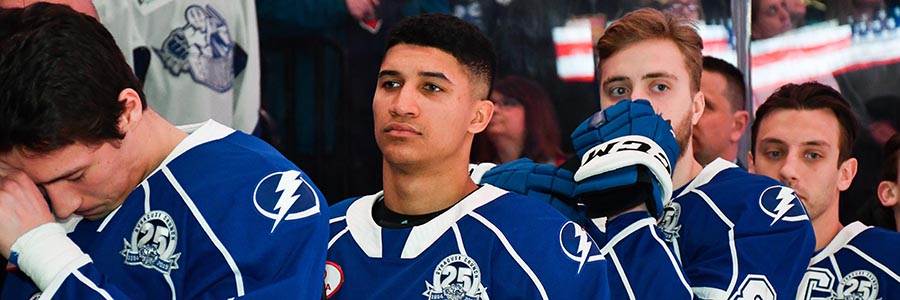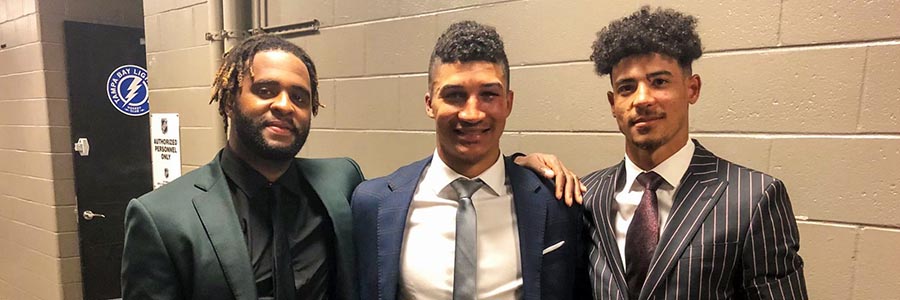📝 by Irie Harris | AHL On The Beat
On February 1st, Daniel Walcott told his team he was changing his skate laces from white to black, to celebrate Black History Month.
He assumed it would just be him, but eventually the whole team followed. The Syracuse Crunch wore black laces together in their game the next day, against the Belleville Senators.
“It was nice to have them join the movement, or at least help me celebrate Black History Month.”
No. 85 is the heart and soul of the Syracuse Crunch, hovering the ice with energetic leadership and defensive tenacity. He is the player who brings the spirit in the locker room, inspires teammates and elicits a roar from the stands as he gives it his all on the ice. No. 85 is Daniel Walcott, and Walcott is a Black man – a Black man associated with a sport that historically has not always been kind to Black players.
Born in L’Ile-Perrot, Quebec, Walcott learned the game of ice hockey from his father David, whom Daniel describes as a “rah-rah” coach. Growing up, he witnessed his father endure racial discrimination and face difficulty finding coaching jobs, as if he had no knowledge of the game. This would create what Walcott calls a “new reality.”
“You don’t want to be too much, but you fall in line with the culture of hockey as a minority,” Walcott said.
Yet, he does his best to stay true to himself and never change.
“You fall in, but at the same time you stay true to yourself and that’s what I try to do.”
As he fell in love with hockey, Walcott also fell in love with the style of play from some of his favorite Black players – Kevin Weekes, a former 10-year NHL goaltender; P.K. Subban, defenseman for the New Jersey Devils and multiple-time NHL All-Star; and Jarome Iginla, only the fourth Black player to ever be inducted into the Hockey Hall of Fame. Walcott remembers watching those players and trying to emulate them.
While Walcott saw these Black players achieving success he strove for on the ice, he found they shared a common experience that until recently hadn’t been widely discussed.

The Hockey Diversity Alliance was founded on June 8, 2020, by players Evander Kane and Akim Aliu with the goal of sparking meaningful conversations regarding racism in hockey.
In January, the HDA partnered with Budweiser Canada and released a two-minute video pointing out issues of racism and launching their #TapeOutHate campaign. The video showed censored versions of multiple tweets containing racial and derogatory terms. The video also highlighted specific incidents these players experienced and what could be done to combat future situations.
Walcott commends the HDA for showing those messages and states a lot of things are posted on the internet, but not always seen.
“You got to put yourself in their shoes, it’s not just one incident, one time for some people. It’s an everyday occurrence. And the only thing that gets seen is the one thing we talk about.”
The impact of the video highlights the prevalence of hate messages athletes receive.
“It goes to show people don’t understand how many messages athletes will get.”
Walcott has found when racial incidents occur, people turn to him to see how to react.
“What do you think? Do you think you would’ve been offended?” are some of the questions he receives.
“If it was borderline, or in the gray area, it shouldn’t have been done.”
Walcott himself has experienced racial incidents in his hockey career. During his first professional season, Walcott recalls going back and forth with another player from the opposing team. After a battle for the puck in front of the net, they both got into each other’s faces.
The opposing player looked at Walcott, laughed, and in a taunting manner said, “you’re Black!”
“You just lose respect for guys in situations like that,” Walcott said. “There’s so many things you can chirp about on the ice, and if you go there, that’s telling me you have nothing to say and you’re going for something that seems easy.”
Walcott doesn’t believe the prevalence of these incidents is extreme, but they do happen more than people assume.
“Either it’s caught or it’s not, but it happens so you can’t just assume it doesn’t.”
Despite facing negative incidents on the ice, this never stopped Walcott from chasing his lifelong dream.
On the night of May 9, 2021, Walcott was on recall to the Tampa Bay Lightning when he received a phone call from head coach Jon Cooper. He was told he would be making his NHL debut the next day.
Walcott’s blood, sweat, and tears became worth it at that moment. Overjoyed with his personal accomplishment, Walcott would soon become a part of hockey history, thanks to Cooper’s next statement.
Cooper mentioned the possibility of starting Walcott with fellow Black teammates Mathieu Joseph and Gemel Smith. He spoke about how they can become trailblazers. Walcott agreed.
On May 10, the Tampa Bay Lighting were on the road against the Florida Panthers. Walcott, Joseph and Smith became the first-ever all-Black starting lineup in NHL history. Their sticks from that night now sit in the Hockey Hall of Fame.

“I’m happy it was done. There was a lot of visibility and hopefully it becomes common.”
Walcott didn’t realize how big of a moment this was, as he focused more on accomplishing his childhood dream. But in the following weeks, the magnitude grew larger as fan sent him messages describing how inspirational the moment was. That was when he understood the impact they made.
The historic game wasn’t the first time the trio played together. All three were teammates together with the Syracuse Crunch where they developed a close friendship.
“We bonded over the fact that we’re three Black players, it’s inevitable. You bond over being Black and you grow a friendship. Fortunately for us, it turned into history.”
Their history-making moment became an inspiration for young hockey fans.
“Someone that looks like you is on the ice and doing great. For me, I hope to be that same inspiration for other young Black kids.”
His intention to inspire doesn’t end with his contributions on the ice. Walcott is involved with the Big Brothers Big Sisters program in Syracuse. His “little brother” Jeremiah was introduced to hockey by Walcott and now attends games with friends. Once the pandemic allows, Walcott plans to create his own outreach program where he plans to introduce hockey to less fortunate communities, providing skates for kids to use on the pond.
While Walcott is serving his part in celebrating Black History Month, the Syracuse Crunch are also using their platform to bring more awareness to the month. Throughout February, the Crunch are highlighting and supporting local predominantly Black non-profit organizations. The team partnered with We Rise Above the Streets Recovery Outreach, the Kia Foundation, PGR Foundation, and 100 Black Men of Syracuse to share their missions with Crunch fan base while raising funds for the non-profits.
 “We plan to raise awareness for the non-profits’ mission statements and what they provide for the Syracuse community,” said Jackie Decker, Crunch community relations manager. “We’re lucky enough to have a great relationship with our players first and foremost, and to have them as a resource and education tool.”
“We plan to raise awareness for the non-profits’ mission statements and what they provide for the Syracuse community,” said Jackie Decker, Crunch community relations manager. “We’re lucky enough to have a great relationship with our players first and foremost, and to have them as a resource and education tool.”
Each week in February, the Crunch will highlight one of the non-profits on their social media pages. The month will end with the team’s Black History Month game on Feb. 26, where all four will have tables on the concourse. Also during the game, the Crunch will use the Hockey Diversity Alliance’s Tape Out Hate tape on their sticks in warm-ups. The tape features “Racism has no place in hockey” written out along with #TapeOutHate. Funds from the team’s game-day auctions hosted on GiveSmart will benefit the four non-profit organizations.
The Crunch will also celebrate Walcott, Joseph and Smith’s historic line with a T-shirt that features Walcott & Joseph & Smith written out with May 10, 2021 below. The shirts are designed and produced by the Print Hub, a Black-run company in Syracuse, and proceeds will benefit the four local non-profits.
February should not be the only days the issues of race are talked about. Walcott’s experience on the ice is not the same experience for every Black player in professional hockey, but too common. There must be consistency in awareness and conversations regarding Black issues and racism. Willie O’Ree, the first Black player to ever play in the NHL, is as of recent starting to receive his very long-overdue flowers. From his jersey retirement in Boston to his induction into the Hockey Hall of Fame, now can be the start of something great for the sport of hockey.






































